Related Research Articles
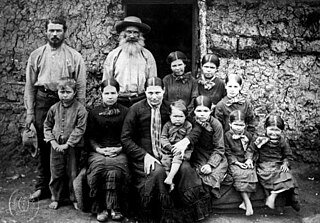
Boers are the descendants of the proto Afrikaans-speaking Free Burghers of the eastern Cape frontier in Southern Africa during the 17th, 18th, and 19th centuries. From 1652 to 1795, the Dutch East India Company controlled the Dutch Cape Colony, which the United Kingdom incorporated into the British Empire in 1806. The name of the group is derived from Trekboer then later "boer", which means "farmer" in Dutch and Afrikaans.

The Cape Colony, also known as the Cape of Good Hope, was a British colony in present-day South Africa named after the Cape of Good Hope. It existed from 1795 to 1802, and again from 1806 to 1910, when it united with three other colonies to form the Union of South Africa, then became the Cape Province, which existed even after 1961, when South Africa had become a republic, albeit, temporarily outside the Commonwealth of Nations (1961–94).

The first modern humans are believed to have inhabited South Africa more than 100,000 years ago. South Africa's first known inhabitants have been collectively referred to as the Khoisan, the Khoekhoe and the San. Starting in about 400 AD, these groups were then joined by the Bantu ethnic groups who migrated from Western and Central Africa during what is known as the Bantu expansion. These Bantu groups were mainly limited to the area north of the Soutpansberg and the northeastern part of South Africa until the later Middle Iron Age, after which they started migrating south into the interior of the country.

The Great Trek was a northward migration of Dutch-speaking settlers who travelled by wagon trains from the Cape Colony into the interior of modern South Africa from 1836 onwards, seeking to live beyond the Cape's British colonial administration. The Great Trek resulted from the culmination of tensions between rural descendants of the Cape's original European settlers, known collectively as Boers, and the British. It was also reflective of an increasingly common trend among individual Boer communities to pursue an isolationist and semi-nomadic lifestyle away from the developing administrative complexities in Cape Town. Boers who took part in the Great Trek identified themselves as voortrekkers, meaning "pioneers" or "pathfinders" in Dutch and Afrikaans.

The history of the Cape Colony from 1806 to 1870 spans the period of the history of the Cape Colony during the Cape Frontier Wars, which lasted from 1779 to 1879. The wars were fought between the European colonists and the native Xhosa who, defending their land, fought against European rule.

The Boer republics were independent, self-governing republics formed by Dutch-speaking inhabitants of the Cape Colony and their descendants. The founders – variously named Trekboers, Boers, and Voortrekkers – settled mainly in the middle, northern, north-eastern and eastern parts of present-day South Africa. Two of the Boer republics achieved international recognition and complete independence: the South African Republic and the Orange Free State. The republics did not provide for the separation of church and state, initially allowing only the Dutch Reformed Church, and later also other Protestant churches in the Calvinist tradition. The republics came to an end after the Second Boer War of 1899–1902, which resulted in British annexation and later incorporation of their lands into the Union of South Africa.

Andries Wilhelmus Jacobus Pretorius was a leader of the Boers who was instrumental in the creation of the South African Republic, as well as the earlier but short-lived Natalia Republic, in present-day South Africa. The large city of Pretoria, executive capital of South Africa, is named after him.

The Trekboers were nomadic pastoralists descended from European colonists on the frontiers of the Dutch Cape Colony in Southern Africa. The Trekboers began migrating into the interior from the areas surrounding what is now Cape Town, such as Paarl, Stellenbosch, and Franschhoek, during the late 17th century and throughout the 18th century.

The Natalia Republic was a short-lived Boer republic founded in 1839 after a Voortrekker victory against the Zulus at the Battle of Blood River. The area was previously named Natália by Portuguese sailors, due to its discovery on Christmas. The republic came to an end in 1843 when British forces annexed it to form the Colony of Natal. After the British annexation of the Natalia Republic, most local Voortrekkers trekked northwest into Transorangia, later known as the Orange Free State, and the South African Republic.
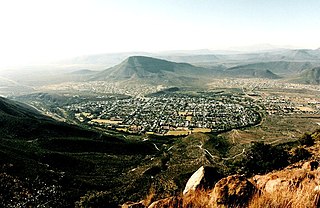
Graaff-Reinet is a town in the Eastern Cape Province of South Africa. It is the oldest town in the province and the fifth oldest town in South Africa, after Cape Town, Stellenbosch, Simon's Town, Paarl and Swellendam. The town was the centre of a short-lived republic in the late 18th century. The town was a starting point for Great Trek groups led by Gerrit Maritz and Piet Retief and furnished large numbers of the Voortrekkers in 1835–1842.
The following lists events that happened during the 1790s in South Africa.

Pieter Mauritz Retief was a Voortrekker leader. Settling in 1814 in the frontier region of the Cape Colony, he later assumed command of punitive expeditions during the sixth Xhosa War. He became a spokesperson for the frontier farmers who voiced their discontent, and wrote the Voortrekkers' declaration at their departure from the colony.

Uys is the surname of a family that played a significant role in South African history during the nineteenth century and made distinguished contributions to South African culture, politics and sports during the course of the twentieth.
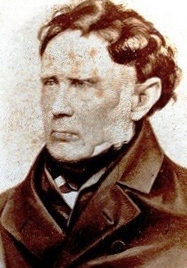
Sir Andries Stockenström, 1st Baronet, was lieutenant governor of the Eastern Province of the Cape Colony from 13 September 1836 to 9 August 1838.
Colonel John Graham was a British soldier and administrator best known for founding the settlement of Grahamstown in the Cape Colony in 1812. Grahamstown went on to become a military, administrative, judicial and educational centre for its surrounding region.
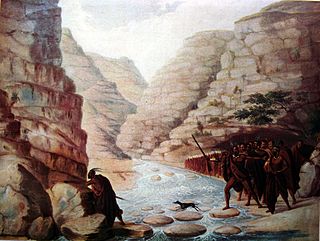
The Xhosa Wars were a series of nine wars between the Xhosa Kingdom and the British Empire as well as Trekboers in what is now the Eastern Cape in South Africa. These events were the longest-running military resistance against European colonialism in Africa.

During the Napoleonic Wars, the Cape Colony was annexed by the British and officially became their colony in 1815. Britain encouraged settlers to the Cape, and in particular, sponsored the 1820 Settlers to farm in the disputed area between the colony and the Xhosa in what is now the Eastern Cape. The changing image of the Cape from Dutch to British excluded the Dutch farmers in the area, the Boers who in the 1820s started their Great Trek to the northern areas of modern South Africa. This period also marked the rise in power of the Zulu under their king Shaka Zulu. Subsequently, several conflicts arose between the British, Boers and Zulus, which led to the Zulu defeat and the ultimate Boer defeat in the Second Anglo-Boer War. However, the Treaty of Vereeniging established the framework of South African limited independence as the Union of South Africa.
Afrikaners are a Southern African ethnic group descended from predominantly Dutch settlers first arriving at the Cape of Good Hope in 1652. Until 1994, they dominated South Africa's politics as well as the country's commercial agricultural sector.

The South African Wars, including but also known as the Confederation Wars, were a series of wars that occurred in the southern portion of the African continent between 1879 and 1915. Ethnic, political, and social tensions between European colonial powers and indigenous Africans led to increasing hostilities, culminating in a series of wars and revolts, which had lasting repercussions on the entire region. A key factor behind the growth of these tensions was the pursuit of commerce and resources, both by countries and individuals, especially following the discoveries of gold in the region in 1862 and diamonds in 1867.
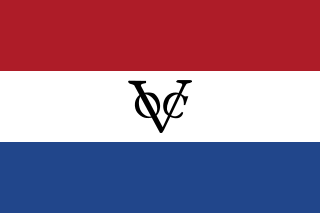
The Dutch Cape Colony was a Dutch United East India Company (VOC) colony in Southern Africa, centered on the Cape of Good Hope, from where it derived its name. The original colony and the successive states that the colony was incorporated into occupied much of modern South Africa. Between 1652 and 1691, it was a Commandment, and between 1691 and 1795, a Governorate of the VOC. Jan van Riebeeck established the colony as a re-supply and layover port for vessels of the VOC trading with Asia. The Cape came under VOC rule from 1652 to 1795 and from 1803 to 1806 was ruled by the Batavian Republic. Much to the dismay of the shareholders of the VOC, who focused primarily on making profits from the Asian trade, the colony rapidly expanded into a settler colony in the years after its founding.
References
- 1 2 "Conquest of the Eastern Cape 1779-1878 | South African History Online". Archived from the original on 2016-12-16. Retrieved 2016-01-07.
- ↑ "Americans defeat the British at Yorktown".
- 1 2 3 Henry Hall, 1859. Manual of South African Geography: Forming a Companion to the Map of South Africa to 16° South Latitude. Cape Town: S. Solomon. p. 161-2.
See Years in South Africa for list of more References